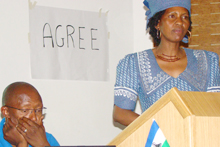
New Article Presents Findings from Study on Barriers to Equity in HIV Caregiving
On June 8, the International Journal for Equity in Health published “Occupational segregation, gender essentialism and male primacy as major barriers to equity in HIV care giving: Findings from Lesotho,” by Constance J. Newman, Linda Fogarty, Lucia N. Makoae, and Erik Reavely. The article describes a study conducted in partnership with the Lesotho Ministry of Health and Social Welfare as part of the Capacity Project, the predecessor to CapacityPlus. The study explored the gender dynamics of HIV/AIDS caregiving and looked at ways in which men might be recruited into the workforce for community- and home-based care. In sub-Saharan Africa, 90% of HIV/AIDS caregiving is provided in the home, where women and girls make up the informal workforce. Men’s greater participation in HIV/AIDS caregiving would lessen the health workforce shortage and increase the equity and sustainability of national and community-level HIV/AIDS caregiving. However, notions of gender essentialism and male primacy make this far from inevitable. HIV/AIDS caregiving is a gender-segregated job, at the core of which lie stereotypes and beliefs about the appropriate work of men and women. This results in an inequitable, unsustainable burden on women and girls.
The study explored the gender dynamics of HIV/AIDS caregiving and looked at ways in which men might be recruited into the workforce for community- and home-based care. In sub-Saharan Africa, 90% of HIV/AIDS caregiving is provided in the home, where women and girls make up the informal workforce. Men’s greater participation in HIV/AIDS caregiving would lessen the health workforce shortage and increase the equity and sustainability of national and community-level HIV/AIDS caregiving. However, notions of gender essentialism and male primacy make this far from inevitable. HIV/AIDS caregiving is a gender-segregated job, at the core of which lie stereotypes and beliefs about the appropriate work of men and women. This results in an inequitable, unsustainable burden on women and girls.
Among the authors’ recommendations are the need to address occupational segregation—and the underlying gender essentialism—to foster sharing of the HIV/AIDS caregiving burden and contribute to a long-term solution to health worker shortages. They also suggest that policy-makers, activists, and programmers work to redress the disadvantages and the gendered economic, psychological, and social impacts entailed in HIV/AIDS caregiving faced by female caregivers. They urge further research on gender desegregation of HIV/AIDS caregiving.
Related items:
Photo by Constance Newman. (Study dissemination event in Lesotho)


